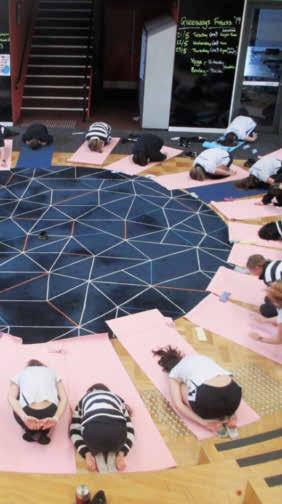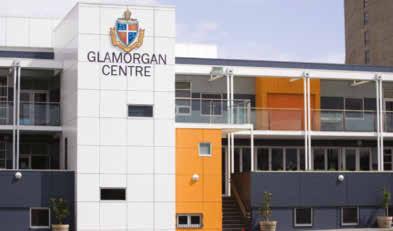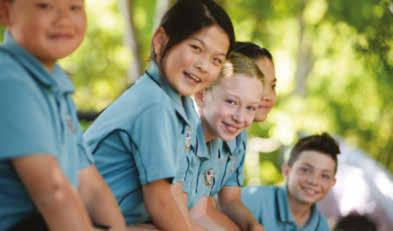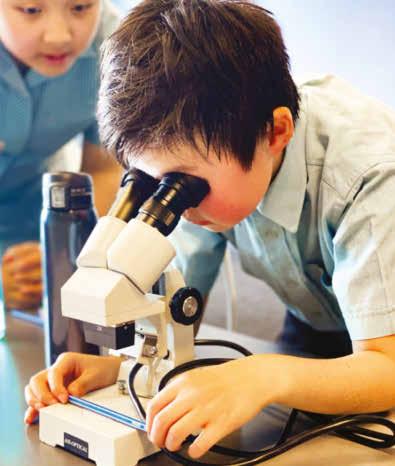
5 minute read
Fintona Girls’ School
Principal Rachael Falloon
Rachael Falloon commenced as Principal in 2018. Her goal is to develop young women who are agile learners – capable, confident and curious; young women who know themselves deeply, embrace opportunity and contribute positively to the world. 79 Balwyn Road, Balwyn VIC 3103
Advertisement
At Fintona, we see the extraordinary in every girl.
Our size allows for deeper learning in the classroom and greater participation across a broad range of co-curricular pursuits. Here, students have more opportunity to discover passions, develop skills and prepare for life after school.
We’re known not only for the excellence of our teachers, but for an environment where students have more access to their teachers. Beyond consistently outstanding VCE and NAPLAN results, the benefit of our approach is seen in our independent and articulate graduates who go on to excel in their field.
In 2021, Fintona celebrates 125 years of providing a wellrounded education that inspires new interests and unlocks new pathways. This year will also see the opening of our new STEM building, the Annie Hughston Centre, named after the school’s founding principal.
Our long tradition of education at the highest standard continues today, as girls master the skills they will need for the future with confidence, energy and drive. Our mission is to deliver a dynamic learning journey, with our exceptional alumni as living proof.
We invite you to learn more about Fintona by talking with our principal, students and staff on a school tour.
THE BASICS
Enquiries
+61 3 9830 1388 fintona.vic.edu.au registrar@fintona.vic.edu.au
Years
ELC – Year 12
Denomination
Non-denominational
Gender
Co-educational ELC; Girls only Prep – Year 12
Fees
Prep $17,684 – Year 12 $30,340
Boarding \ No
Scholarships \ Yes
ATAR \ Median ATAR is 91.1, Dux 99.7*
EXCELLENCE
We offer a diverse and challenging approach to academic excellence that celebrates a love of learning across a wealth of disciplines. Our curriculum is immersive, integrated and underpinned by real-world applications.
OPPORTUNITY
We balance a diverse education with engaging activities beyond the classroom, including choir, music ensembles, Guides, house competitions, sport, drama, public speaking, debating, Duke of Edinburgh, study tours and many clubs.
* Results are provided by the school, Domain does not warrant their accuracy
DEVELOPMENT
A smaller school and class sizes allow us to see, know and connect with every student. Our focus is on unlocking potential and inspiring passions. At Fintona, every student is enabled to thrive.
WELLBEING
A culture of belonging and wellbeing is at the centre of school life. All Fintona staff, including our School Counsellor, provide confidential and individual support, alongside programs designed to develop resilience and leadership.
FOSTERING RESILIENCE & WELLBEING
The pandemic has resulted in student uncertainty but these programs aim to hand them control.
BY PETER HANLON
THE SIMPLE ART OF CONNECTING
When Hugh van Cuylenburg wowed the Mentone Grammar community in 2016 with his presentations about the power of The Resilience Project, it invited a natural next step for the school’s wellbeing focus, which was already underpinned by Yale University’s RULER Program up to the end of year 9.
“We looked at our year 10 and VCE students and felt they needed something different,” Mentone Grammar’s director of student wellbeing, Cameron Lancaster, says. “The Resilience Project fitted with what we were looking to do – it’s tenets of gratitude, empathy and mindfulness fitted with the direction we wanted to go.”
Van Cuylenburg’s inspiration for The Resilience Project was time spent in northern India, living alongside people who had little yet were gloriously happy. At Mentone Grammar, the connection it fosters as part of the curriculum –through groups of 16-17 students engaging with their mentors in roll call each morning, taking part in activities that have mindfulness and gratitude built in, and through longer weekly sessions for deeper exploration – has been powerful at a disjointed time.
“During COVID, the connections our staff and students had with each other were a reason we feel we coped with remote learning as well as we did,” Lancaster says. “It was those touch bases‚ the conversations, little things like, ‘We’re going to have a pizza lunch’, and everyone was online cooking their own pizza. We had‚ ‘Red Day’, ‘Funny Hat Day’, all sorts of things.
“They might sound simple, but if you can get the students buying into them, they see that others are still doing the same things they’re doing. When students feel like they’re acting in isolation or are literally on their own, that’s when we worry more about their mental health. When they’re checking in and maintaining that sense of connection, that was very, very important for us last year.”
Rupert Saunders, a senior clinical advisor with Headspace, says the simple act of connecting can be a powerful tool in trying to calm the upheaval caused by

the pandemic and the uncertainty it has created about the future.
“Have conversations, frank and open, about how they’re feeling,” he suggests, an approach that can combat anxiety both at home and in the classroom. “You might get shut down, but you need to say, ‘That’s cool. I’ll come back to you when you’re feeling more comfortable. I’m here for you.’ Give that message of love and support.”
At Methodist Ladies’ College, teaching hope and optimism at such a time is helped by concentrating on the small, everyday things that can be controlled and steering students away from dwelling on the uncertain big picture.
MLC’s director of student wellbeing, Lisa Gatliff, highlights the importance of creating certainty where possible‚ in building a routine around healthy eating, exercise and that vital act of connection‚ and finding positivity and happiness in helping others.
“We have a strong community service focus, on doing something beyond yourself,” she says. “It was really pleasing [in 2020] to see how many students took up their own individual ways of helping others in the community, doing things like knitting blankets for disadvantaged children in South Africa, or doing artworks for residents in aged care.
Recognising that visual contact between teachers and students was important for learning and wellbeing, every MLC student had a designated teacher to oversee their wellbeing. The school worked hard on maintaining these one-on-one catch-ups last year and has continued it since the return to face-toface learning.
The idea that every student has multiple support networks around them‚ classroom and wellbeing teachers, counsellors, co-ordinators, nurses‚ is strongly promoted. Gatliff sees young people who have engaged with these networks like never before and is optimistic about the resilience that such engagement has helped build.
“I think that’s a message of hope for the future,” she says.
LISA GATLIFF








